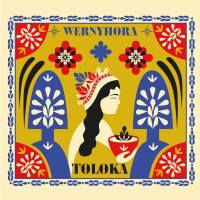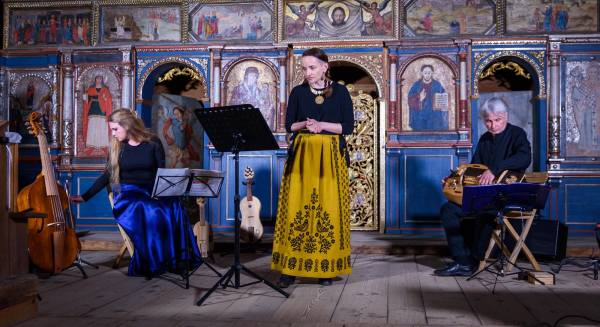 The trio Wernyhora come from the town of Sanok, which is in the extreme south-east of Poland, on the edge of the Carpathians near the meeting of Poland with Ukraine and Slovakia. So it’s natural that they focus on the traditional songs of their region, where several peoples meet including the minority Boykos and Lemkos who speak dialects of Ukrainian.
The trio Wernyhora come from the town of Sanok, which is in the extreme south-east of Poland, on the edge of the Carpathians near the meeting of Poland with Ukraine and Slovakia. So it’s natural that they focus on the traditional songs of their region, where several peoples meet including the minority Boykos and Lemkos who speak dialects of Ukrainian.
This, Wernyhora’s second album, was part of their prize for winning Polish Radio 2’s New Tradition competition in 2021. The majority of the songs, which are all in Ukrainian (with booklet Polish and English translations of their very interesting and beautiful lyrics), are drawn from the many-volume collection that ethnologist Oskar Kolberg made across Poland in the 19th century, plus some from more recent sources including one from field recording work by the group’s hurdy-gurdyist Maciej Harna.
Singer Daria Kosiek has a strong, energetically expressive voice. She’s accompanied by the rich textures of the bowed strings of Anna Oklejewicz (vielle, rebec, violin, viola da gamba and cello) and Maciej Harna (hurdy-gurdy). They’re joined for some tracks by Wojciech Lubertowicz on frame drums, traban (deep side-drum) and duduk, and illustrious bassist and composer Marcin Pospieszalski, who produced the album.
The songs are pretty much all about less than satisfactory human relationships, in which frequently the husband or object of affection turns out to be a wrong’un.
So the jolly-sounding - or is it angry - opener, whose title translates as “A Ya Sobi Na Horbochku (I Am On A Hill),” is in the voice of a girl who, despite her mother beating her for it, yearns for a man who seems to have disappeared leaving her badly in the lurch. It’s followed, in “It Was Not To Dig,” by the anger of a girl whom a man has promised to marry, or perhaps even has, but she’s seen his true nature and rants "Get away from me, you slacker.”
Relationships don’t improve in “Chervena Ruzha (Red Rose),” where meaty drums join the churning parallel-fifth harmonies of the strings in four brisk two-line verses, repeated, that seem to be the lament of a mother whose daughter leaves the Beskid region to seek a boyfriend. In the slow, beautiful “On The High Vast Meadows,” sung plaintively over a shifting string drone, a boy gets a say, so lovelorn for the girls mowing on the high meadows that he’s distracted from his own grass-cutting work.
By way of relief from worldly cares, there follow two fine Christmas songs about the nativity, both with lyrics that say a good deal more, from interesting angles and in far more muscular and non-tinselly fashion, than most of our English-language Christmas songs and carols.
Even though “A Bountiful Evening” pays tribute to kind people, and describes the bringing of new life with the birth of new foals, lambs and calves, and the arrival of swallows, nevertheless: "the new moon does not dawn, my darling one does not come.” And in the sprightly “Do Not Beat Me” it’s back to being beaten by her mother for going with another slacker: "Do not beat me, my mother, with a birch rod, you will not part me from him, I am in love with this troublemaker.”

|
|
“Oh Sobosin, Soboseiko,” played over an inexorable plucked bass phrase, relates to the fire lit on the Slavic midsummer festival of Ivana Kupala. This particular seasonal song, though, has a dark, sacrificial side: "Let’s bake a black cat; we will share it, we will divide it among the boys, we will divide it among the girls … the boys will eat it gladly; one of them did not get it - let him tear the fat out of the cat,” and goes on to connect the burning of the flame with the man’s beauty burning out while the maiden’s blooms.
A sad recitative over hurdy-gurdy and deep drums and bass, leading into the keening of duduk, in another tale of familial violence in “Oh At Night.” Yakym comes home past midnight, beats his wife, then beheads her with a scythe, apparently on the advice of his mistress. But the neighbor comes and asks the children where their mother is; they think she’s gone to fetch the calves, but are told they’re now orphans. Yakym goes to his mistress and tells her what he’s done, and asks her to come and live with him. But the mistress refuses, saying "you have many children and I’d have to work for them.” Whereupon Yakym cries his regret: "Why did I do that? I killed my wife because of my mistress, God help me!”
The band tell us in their notes that the album title Toloka - "tloka” in Polish - is "an old word which was used in the past to describe neighborly and free help in the event of an emergency.” They continue, "At this special time, when our neighbors in Ukraine are in the middle of a bloody war, we would like our Toloka to show the beauty of the songs from the Boyko, Lemko, Transcarpathia and Podolia regions in the hopeful anticipation of a common, neighborly meeting and singing.”
The album closes with “Zurba (Sorrow)” from Podolia, with powerful lyrics that are so expressive and so relevant to the current appalling invasion of Ukraine, particularly as it continues into harsh winter, that I’ll quote them in full.
My mother gave birth to me
On a dark night
She gave me a soldier’s posture
And black eyes
It was, my mother
Not to give me a soldier’s posture
But it was, my mother
To give me happiness and fortune
Grow up, dry oak
There will be a frost tomorrow
And for you, good lad
There will be a campaign tomorrow
I am not afraid of frost
Tomorrow I will prove myself
I am not afraid of the campaign
I will always get out
Crying sweetheart, crying sweetheart
With black eyes
Dinner is on the table
Sad death over her shoulders
Musically, a fine album indeed, but, as ever when we’re dealing with the musics of the world in their many languages, there’s so much more to it than just the way it sounds.
Note: Janusz Radwański, well deserves a mention here as the translator of the songs into English for the booklet.
Find the artist online.
Further reading:
Kapela Maliszów and WoWaKin
Karolina Cicha & Spolka
|

